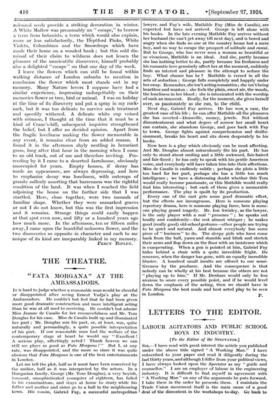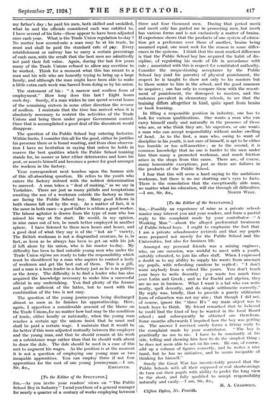LETTERS TO THE EDITOR.
LABOUR AGITATORS AND PUBLIC SCHOOL BOYS IN INDUSTRY.
[To the Editor of the SPECTATOR.] SIR, —I have read with great interest the article you published under the above title signed " A Working Man." I have subscribed to your paper and read it diligently during the last thirty years, and although I differ from your political views, I have always looked upon the Spectator as my " guide and counsellor." I am an employer of labour in the engineering industry. It is difficult to find myself in agreement with " A Working Man " on any of the arguments he puts forward. I take these in the order he presents them. I maintain the Trade Union movement itself is the main cause of a good deal of the discontent in the workshops to-day. Go back to
my father's day ; he paid his men, both skilled and tmskilled, what he and the officials considered each was entitled to. I have several of his lists—these appear to have been adjusted once each year. What is the Trade Union regulation to-day ? No matter how second-rate a man may be at his trade, he must and shall be paid the standard Tate of pay. Every establishment or railway has to carry a certain percentage of such men, with the result that the best men are admittedly hot paid their full value. Again, during the' last few years many of the Trade Unions refused to allow any overtime to be worked. Think for a moment what this has meant to a man and his wife who are honestly trying to bring up a large family, and although the man might have been able to make a little extra each week was barred from doing so by his union.
The statement of his : " A narrow and soulless form of employment." How long does this last ? Eight hours each day. Surely, if a man wishes he can spend several hours of the remaining sixteen in some other direction the reverse of soulless. I maintain that the time has arrived when it is absolutely necessary to restrict the activities of the Trade Unions and bring them under proper Government control. Once that is accomplished a good deal of the discontent would disappear.
The question of the Public School boy entering factories. Within limits, I consider this all for the good, either he justifies his presence there or is found wanting, and from close observa- tion I have no hesitation in saying that unless he holds in reserve the best qualities which the Public School training stands for, he sooner or later either deteriorates and loses his post, or asserts himself and becomes a power for good amongst the workers in the factory.
Your correspondent next touches upon the human side of this all-absorbing question. He refers to the youth who enters the factory imbued with the noblest determination to succeed. A man takes a " deal of making," as we say in Yorkshire. There are just as many pitfalls and temptations awaiting the son of a workman outside the factory as there are facing the Public School boy. Many good fellows in both classes fall out by the way. As a matter of fact, it is the same in both cases—a good talker is seldom a good worker. The labour agitator is drawn from the type of man who has missed his way at the start. He would, in my opinion, in nine cases out of ten, be much better employed in another sphere. I have listened to these men hours and hours, and a good deal of what they say is of the " hot air " variety. The British workman is not a disgruntled creature, he is, in fact, as keen as he always has been to get on with his job if left alone by his union, who is his master to-day. My difficulty has been to find suitable young men who under the Trade Union regime are ready to take the responsibility which must be shouldered by a man who aspires to control a body of workmen and get the best out of them. This is a gift, and a man is a born leader in a factory just as he is in politics or the Army. The difficulty is to find a leader who has also acquired the knowledge necessary to make him a successful official in any undertaking. You find plenty of the former and quite sufficient of the latter, but to meet with the combination of the two is not easy.
The question of the young journeyman being discharged almost as soon as he finishes his apprenticeship. Here, again, I apportion a considerable amount of the blame on the Trade Unions, for no matter how bad may be the condition of trade, either locally or nationally, when the young man reaches a certain age the unions insist that he must and shall be paid a certain wage. I maintain that it would be far better if this were adjusted mutually between the employer and the young man, and that he should remain at his work on a subsistence wage rather than that he should walk about to draw the dole. The dole should be used in a case of this sort to augment his wages. As the position is at the moment it is not a question of employing one young man or two incapable apprentices. You can employ three if not four apprentices for the cost of one young journeyman.—I am,







































 Previous page
Previous page